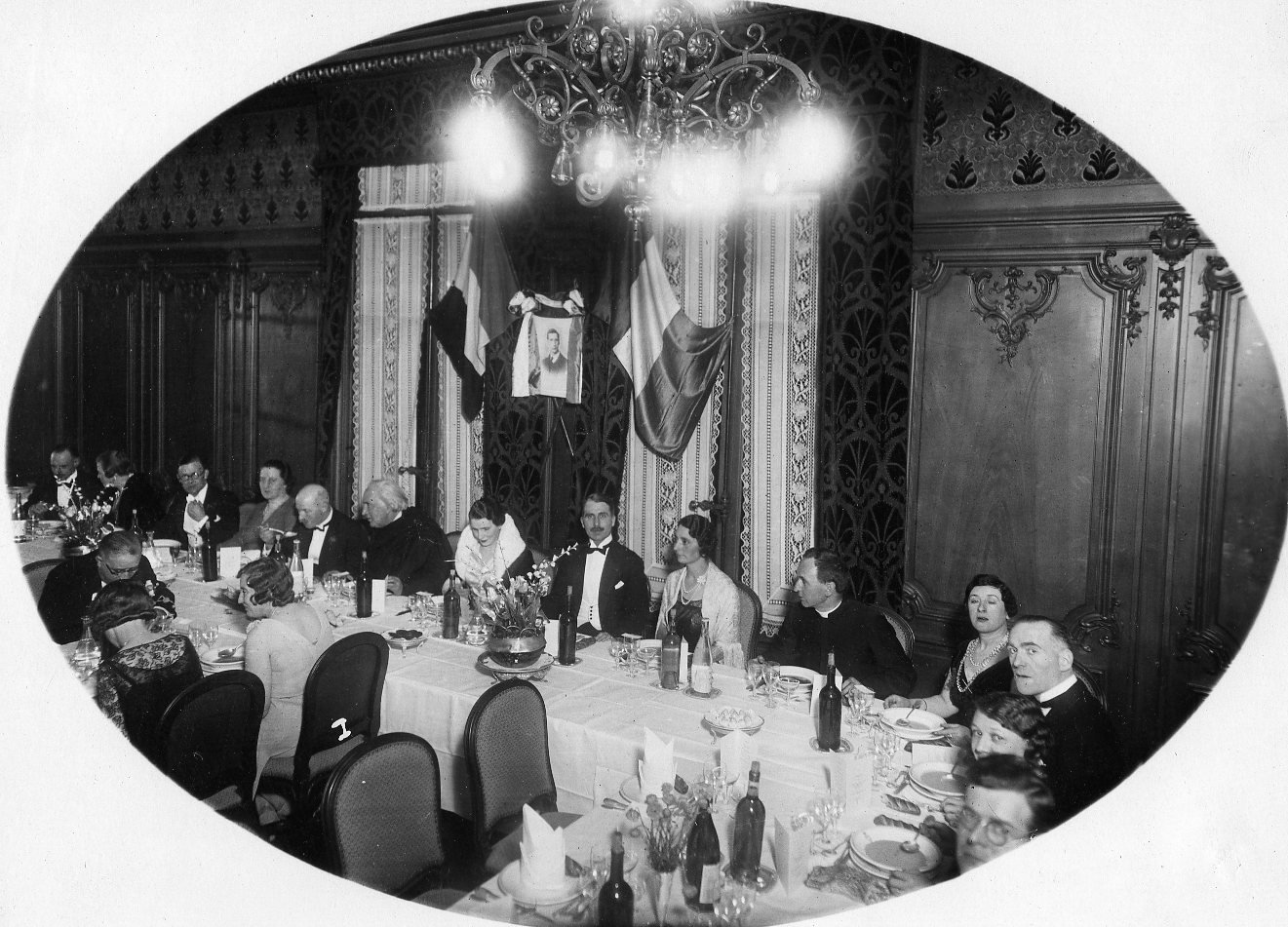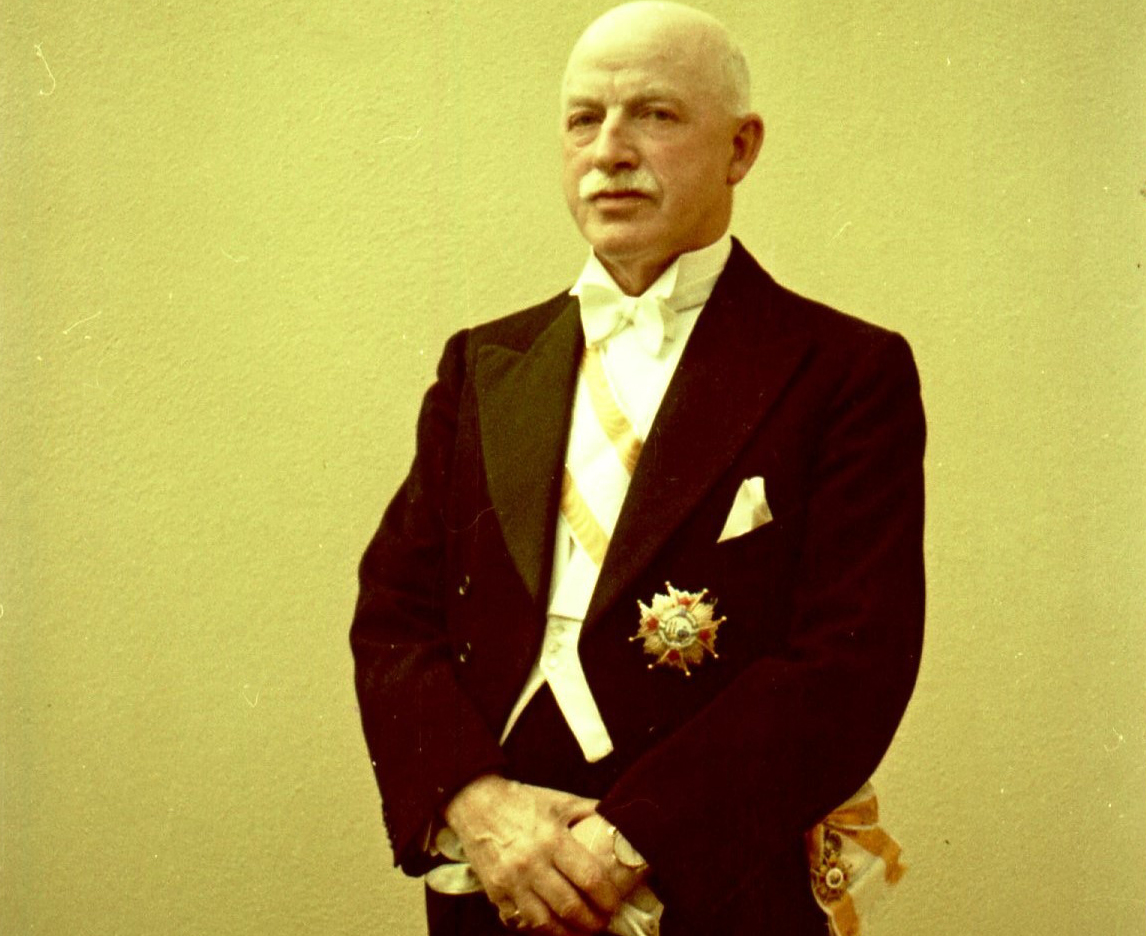Global Lives: Leopold Kerney
By Barry Whelan
The importance of Leopold Kerney has only recently begun to be appreciated by historians of the revolutionary period, who realise that the real genesis of Irish foreign policy was forged and created by the first generation of Irish diplomats, who, with scant resources and no staffing, forged links between Ireland and the world between 1919 and 1923.
Kerney was one of those diplomats.
He was recruited to the nascent Irish diplomatic service without any training or expertise, yet established formal links between the Irish Republic and the French state, and between Irish and French businesses, with the dual objectives of breaking Britain’s dominance over Ireland’s economic life and reinforcing the concept of Ireland as an independent state in the French public mind. He continued this objective in every diplomatic mission that he served throughout his life – Spain, Argentina, Chile – combining trade relations with propaganda and political work. Kerney’s career, in short, was dedicated to promoting, and furthering, Ireland’s place on the international stage.
Leopold Harding Kerney was born on 11 December 1881 in Sandymount, Dublin. His childhood was defined by financial privilege, a Protestant schooling and a British-centred outlook best displayed through his sports activities – captaincy of the local cricket team. During his adolescence he began reading Irish political works by authors such as John Mitchel, whose argument that British maladministration had caused the Great Irish Famine, left a lasting impression on Kerney, leading him to question what he was being taught at school: ‘one hour of English history five days a week and one half-hour of Irish history every Saturday – the Irish history being a narrative of English military victories in Ireland and Irish crimes, and written by an Englishman of course’. His interest in economics and Ireland’s place in the world continued into his adolescence. Following his father’s wishes, he attended Trinity College Dublin, but never graduated. In 1901 he emigrated and travelled across Europe before finally settling in Paris in 1912 where he worked as a cashier and chief accountant at Lady Duff Gordon’s international fashion firm, Lucile Ltd.
Kerney lived in the French capital throughout the First World War. He avoided conscription into the British Army and it was during this time that he read in the French newspapers about the Easter Rising. Whilst he personally greeted the rebellion warmly, such events were too remote for him to take an active part. Moreover, French public opinion had responded negatively to the Rising in Dublin.
1919 would prove a crucial year in Kerney’s connection with the Irish Revolution. After Dáil Éireann appointed delegates to campaign for Ireland’s admission to the Paris Peace Conference, Kerney called into the republican mission at the Grand Hotel to offer voluntary assistance of any kind. He impressed Dáil envoy Seán T. O’Kelly with his fluency in French and his expertise in trade matters, leading to Kerney agreeing to offer ‘advice and assistance to Irish firms desirous of trading with France’ and any matters of a ‘commercial nature’. Kerney believed that promoting closer economic ties between France and Ireland would psychologically reinforce the idea of Irish independence from Britain: ‘I was convinced of the soundness of Arthur Griffith’s policy of direct trade between Ireland and other countries and of the desirability of eliminating the control exercised by English intermediaries over all trade between Ireland and countries other than England’. On 31 July he was received by Arthur Griffith in Dublin, who formally appointed him trade representative of the Dáil in France: ‘Griffith produced from one of his pockets £50, representing the first quarter’s payment in advance, in £1 notes, the dirty appearance of which struck me very much; he also handed me my Credentials as Trade Representative to France from the elected Government of the Irish Republic’.
On his own initiative, Kerney then travelled around France, Belgium, the Netherlands and Spain, for which he claimed no expenses and built up a network of clients, businessmen, and investors who were willing to deal directly with Irish companies rather than through British intermediaries. Kerney had no facilities, no car, and no staff to assist him with this boycott of British policy, confiding that ‘nothing gave me greater pleasure than to translate and circulate as widely as possible the successive Boycott Orders which reached me from Mr Blythe, Minister for Commerce’. Over time his efforts began to achieve results: ‘many French firms availed themselves of the opportunity thus presented to them. My work attracted the attention of the French authorities, and I received notable assistance from the Office National du Commerce Exterieur. I received many visits from Irish exporters and importers. I remember having Irish toilet soap put on sale in Paris, and, at the same time, French household soap imported into Ireland. I helped to establish a trade in rabbit skins with France. I met with some success in having “jambon de York” retailed to the public as “Irish ham”’.
He also wrote detailed reports on new industries that he believed could be established in Ireland: ‘I visited sugar factories in the north of France and made reports on that industry with a view to its introduction into Ireland’. The presence of Ireland became increasingly better known to the French public and to state authorities. In July 1921, Kerney led the Irish Farmers’ Union in negotiating direct agricultural ties between Ireland and continental Europe at the International Agricultural Confederation, an organisation dedicated to promoting interstate trade and cooperation. In 1922 he was given a prominent position as a distinguished guest – ‘Consul General of the Irish Republic’ – by the Mayor of Lyons Edouard Herriot at the inauguration of the Lyons Fair.

Leopold Kerney hosting the Saint Patrick’s Day banquet in Paris for Irish sympathisers and the Irish colony in France. (Image: Leopold Kerney Private Archive)
Kerney also established an Irish-French society, developing republican propaganda material, and organising the annual Saint Patrick’s Day banquet at the Palais d’Orsay restaurant for the Irish community, and their sympathisers, in France. His greatest achievement was the establishment of a shipping company directing large scale Irish-French trade. He secured French investment of 500,000 francs, and the backing of Cork Chamber of Commerce and Shipping and the Cork Industrial Development Authority, for the launch of the SS Banba – a ship to carry goods and people between Brest, Cork and Dublin. The adventure was not without its risks at the time given the British presence in Cork harbour: ‘there was some suspicion as to the nature of the cargo we carried in those troublous [sic] times; we ran the gauntlet, as we berthed, of numerous loaded rifles carried, as it seemed to us, somewhat nonchalantly at disquieting angles’. The project nonetheless was a major success. It marked a significant break in Ireland’s historic link as a colony because it challenged Britain’s monopoly and total dominance on all maritime traffic around the Irish seas. This demonstrated that Ireland could manage its own external trade affairs. For Kerney, this proud moment fulfilled the dream of a lifetime and his central republican philosophy – secure Irish freedom through trade, and re-orientate its economy away from Britain, towards the continent.
Following the Anglo-Irish Treaty of 1921 Kerney sided with the anti-Treaty side: ‘to my mind, the Republican regime was the only legal one, because it rested on the clearly-expressed will of the Irish people, in direct opposition to the will of England. I could not, in my heart and conscience, accept the theory that the government of Ireland by England was legal in any degree’. To pro-Treaty leaders he was a ‘traitor’; to anti-Treaty republicans he was a loyal and trustworthy colleague. His remaining years were defined by his professional and personal friendship with Éamon de Valera, who appointed him Consular and Diplomatic Envoy of the Irish Republic, 1922 - 1926. In 1932, after de Valera’s electoral victory, Kerney was reinstated back into service as commercial attaché in France before being appointed Ireland’s first minister to Spain in 1935, a position he held until December 1946.
Despite his retirement, the Irish Government requested Kerney lead a landmark trade and political mission to South America in 1947, at a time of deepening post-war political isolation and acute economic challenges caused by severe Arctic weather. The mission secured over 250,000 tons of maize to stave off the domestic economic crisis and established direct diplomatic ties with Chile and Argentina.
Kerney’s final years were defined by controversy and ill
health. In 1954 he filed a libel action against a prominent
historian, Professor Thomas Desmond Williams, who had charged
Kerney with endangering Irish neutrality during the Second World
War by meeting senior German officials. Kerney won his action,
forcing a public apology from Williams that stated that any
imputations that the historian had made were ‘based on
statements now proved to be wrong’. The libel action took a
toll on Kerney’s health. He suffered repeated strokes and
died in June 1962. In attendance at his funeral was his lifetime
friend and colleague – Éamon de Valera.
Leopold Kerney’s was truly a ‘global life’.
Forced to emigrate from his homeland, he settled in France and from there continued to campaign and advocate for an independent Ireland, in the forms of international trade. His vision for Irish foreign policy in this respect has stood the test of time, as evidenced by the title of the Irish state’s branch of international diplomacy: the Department of Foreign Affairs and Trade. Kerney exported the concept of Ireland across Europe as he strengthened economic and political ties with France, Belgium, the Netherlands, Portugal and Spain in the 1930s, and to global markets through his mission to Latin America in the 1940s. He was a revolutionary diplomat, recruited without formal interview, training, or a grounding in the etiquette of diplomacy. Éamon de Valera would later eulogise Kerney’s achievements in international affairs: ‘there is nothing that can be said about Mr Kerney except that which is good’.
Dr. Barry Whelan is a historian in Dublin City University specialising in Irish and European twentieth century history. He is the author of Ireland’s Revolutionary Diplomat: A Biography of Leopold Kerney (University of Notre Dame Press, 2019)





















